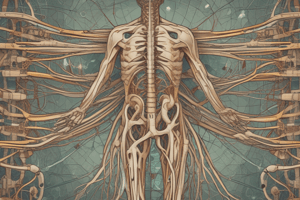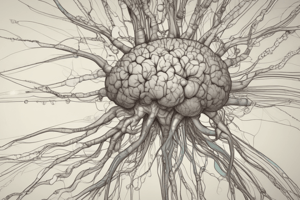Podcast
Questions and Answers
What is the effect of adrenergic receptor alpha-1 on the detrusor muscle?
What is the effect of adrenergic receptor alpha-1 on the detrusor muscle?
- Variable response
- Relaxation
- No effect
- Contraction (correct)
Which neurotransmitter is primarily involved in the erection of genitalia?
Which neurotransmitter is primarily involved in the erection of genitalia?
- Norepinephrine
- Acetylcholine (correct)
- Serotonin
- Dopamine
What is the primary action of presynaptic alpha-2 autoreceptors?
What is the primary action of presynaptic alpha-2 autoreceptors?
- Increase neurotransmitter synthesis
- Promote smooth muscle contraction
- Inhibit NE release (correct)
- Enhance ACh release
How do beta-2 adrenergic receptors affect the uterus?
How do beta-2 adrenergic receptors affect the uterus?
What is the role of cholinergic nicotinic receptors in the adrenal medulla?
What is the role of cholinergic nicotinic receptors in the adrenal medulla?
What adrenergic receptor subtype mediates relaxation of the sphincter muscle?
What adrenergic receptor subtype mediates relaxation of the sphincter muscle?
Which of the following medications is indicated for the treatment of glaucoma?
Which of the following medications is indicated for the treatment of glaucoma?
Which adrenergic receptor subtype is primarily associated with ejaculation and vaginal contraction?
Which adrenergic receptor subtype is primarily associated with ejaculation and vaginal contraction?
What is the primary indication for the use of Varenicline?
What is the primary indication for the use of Varenicline?
Which receptor subtype is associated with presynaptic inhibition of ACh release in autonomic nerve endings?
Which receptor subtype is associated with presynaptic inhibition of ACh release in autonomic nerve endings?
Which of the following agents is used to manage motion sickness?
Which of the following agents is used to manage motion sickness?
What is the role of Ipratropium in treatment protocols?
What is the role of Ipratropium in treatment protocols?
Which of the following is a depolarizing nicotinic receptor antagonist used during surgical paralysis?
Which of the following is a depolarizing nicotinic receptor antagonist used during surgical paralysis?
Which medication is utilized for facilitating bladder function in urinary retention?
Which medication is utilized for facilitating bladder function in urinary retention?
Which drug is indicated for Parkinson's disease treatment?
Which drug is indicated for Parkinson's disease treatment?
What is the primary indication of Methacholine in clinical practice?
What is the primary indication of Methacholine in clinical practice?
Which medication is a nondepolarizing neuromuscular blocker?
Which medication is a nondepolarizing neuromuscular blocker?
What condition is treated with Dobutamine?
What condition is treated with Dobutamine?
Which drug is a selective α2 receptor agonist used to treat hypertension?
Which drug is a selective α2 receptor agonist used to treat hypertension?
Which of the following medications is used for asthma rescue therapy?
Which of the following medications is used for asthma rescue therapy?
What is the primary use of Tamsulosin?
What is the primary use of Tamsulosin?
Which drug class does Pseudoephedrine belong to?
Which drug class does Pseudoephedrine belong to?
Which medication is a β3 receptor agonist indicated for overactive bladder?
Which medication is a β3 receptor agonist indicated for overactive bladder?
Which of the following medications is primarily used to treat ADHD?
Which of the following medications is primarily used to treat ADHD?
Flashcards
ACh Receptor Agonists
ACh Receptor Agonists
Drugs that mimic the effects of acetylcholine at muscarinic and/or nicotinic receptors.
Muscarinic Receptor
Muscarinic Receptor
A type of acetylcholine receptor involved in many bodily functions.
Glaucoma treatment
Glaucoma treatment
Using Pilocarpine to manage high eye pressure in glaucoma.
Urinary Retention
Urinary Retention
Signup and view all the flashcards
Smoking cessation
Smoking cessation
Signup and view all the flashcards
COPD
COPD
Signup and view all the flashcards
Motion sickness
Motion sickness
Signup and view all the flashcards
Surgical paralysis
Surgical paralysis
Signup and view all the flashcards
Urinary System: Detrusor Muscle
Urinary System: Detrusor Muscle
Signup and view all the flashcards
Urinary System: Sphincter Muscle
Urinary System: Sphincter Muscle
Signup and view all the flashcards
Urinary System: Ureter
Urinary System: Ureter
Signup and view all the flashcards
Reproductive System: Uterus
Reproductive System: Uterus
Signup and view all the flashcards
Reproductive System: Genitalia
Reproductive System: Genitalia
Signup and view all the flashcards
Autonomic Nerve Endings: Autoreceptor
Autonomic Nerve Endings: Autoreceptor
Signup and view all the flashcards
Autonomic Nerve Endings: Heteroreceptor
Autonomic Nerve Endings: Heteroreceptor
Signup and view all the flashcards
Adrenal Medulla
Adrenal Medulla
Signup and view all the flashcards
Nondepolarizing Muscle Relaxant
Nondepolarizing Muscle Relaxant
Signup and view all the flashcards
Rocuronium
Rocuronium
Signup and view all the flashcards
Epinephrine
Epinephrine
Signup and view all the flashcards
Pseudoephedrine
Pseudoephedrine
Signup and view all the flashcards
Amphetamine
Amphetamine
Signup and view all the flashcards
Methylphenidate
Methylphenidate
Signup and view all the flashcards
Phenylephrine
Phenylephrine
Signup and view all the flashcards
Clonidine
Clonidine
Signup and view all the flashcards
Study Notes
Autonomic Nervous System (ANS)
- The ANS is part of the peripheral nervous system (PNS), acting as a conduit between the central nervous system (CNS) and peripheral organs.
- It regulates subconscious functions of internal organs, modulated by input from the hypothalamus and brainstem, reacting to internal and external stimuli. This includes stimuli interpreted by brain regions like the limbic system and cerebral cortex.
- The ANS maintains homeostasis by altering organ functions in response to various stimuli.
- It employs a two-neuron efferent pathway.
Anatomical Connections
- Parasympathetic: Preganglionic neurons originate in the craniosacral regions of the spinal cord/brainstem, projecting to ganglia near or within the effector organ.
- Sympathetic: Preganglionic neurons arise in the thoracolumbar region of the spinal cord, projecting to ganglia near the spinal cord, specifically the sympathetic chain.
- The adrenal medulla receives sympathetic innervation, releasing epinephrine directly into the bloodstream.
Neurotransmitters and Receptors
- All preganglionic axons release acetylcholine.
- Parasympathetic postganglionic neurons release acetylcholine.
- Sympathetic postganglionic neurons primarily release norepinephrine, with acetylcholine release from sweat glands.
Neurotransmitter Pathways
- Acetylcholine synthesis and degradation mechanisms are involved.
- Norepinephrine synthesis and degradation pathways are presented.
- Epinephrine synthesis is detailed.
Receptor Types
- Nicotinic receptors are ligand-gated ion channels located at the neuromuscular junction, parasympathetic ganglia, and adrenal medulla.
- Muscarinic receptors are G protein-coupled receptors (GPCRs) found on effector organs of the parasympathetic nervous system, and in some cases, the sympathetic nervous system (like sweat glands).
- Adrenergic receptors, also GPCRs, come in alpha (α1, α2) and beta (β1, β2, β3) subtypes, with diverse effects.
Parasympathetic and Sympathetic Actions
- Detailed tables outlining the effects of parasympathetic and sympathetic stimulation on various organs, including pupil dilation/constriction, glandular secretions, heart rate, and blood vessel constriction/dilation, and other physiological effects.
Autonomic Tone
- Autonomic tone is the balance between sympathetic and parasympathetic activity, influencing organ function based on internal and external stimuli. An imbalance can be linked with various health conditions.
Studying That Suits You
Use AI to generate personalized quizzes and flashcards to suit your learning preferences.
Related Documents
Description
This quiz covers the key concepts of the Autonomic Nervous System (ANS), including its role in regulating subconscious functions and maintaining homeostasis. Explore the anatomical connections of the sympathetic and parasympathetic divisions, as well as their pathways from the spinal cord and brainstem to peripheral organs.




